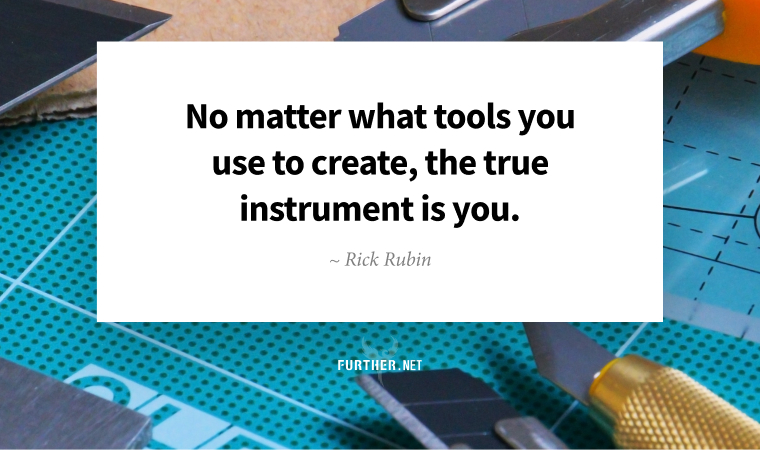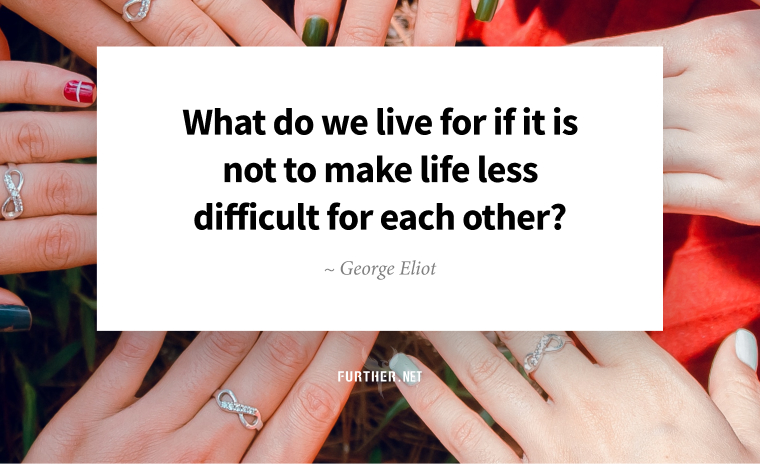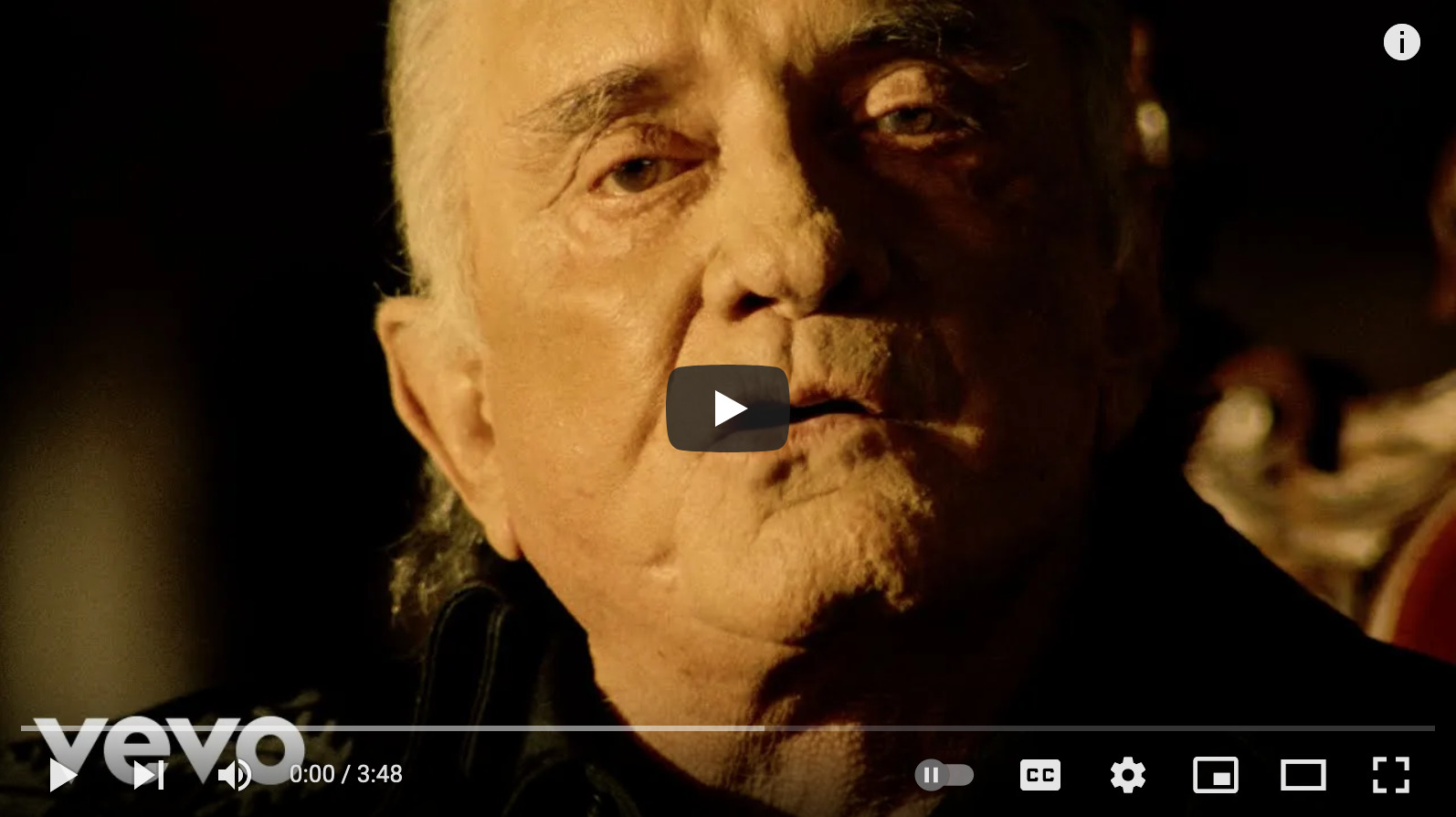You are a Creative Force 
Times are changing, fast. We've talked a lot here at Further about how AI is upending our lives, potentially taking our jobs precisely when we need them most. But there's one place where experts say AI can't replace us, and that's in the creativity department. As writer J. Thorn says in his book on AI-powered storytelling: AI serves as a tool to enhance your creative process, not to replace your unique spark. While Thorn is specifically speaking to writers, his advice is universal. And that's because whether you think of yourself as a creative type or not, you are a creator. But don't take my word for it — let the legendary Rick Rubin, co-founder of Def Jam Records and producer of iconic music from bands including the Beastie Boys, Run-DMC, Public Enemy, Red Hot Chili Peppers, Jay-Z, and Weezer, among others, explain, from this book, The Creative Act: A Way of Being: Creativity is not a rare ability. It is not difficult to access. Creativity is a fundamental aspect of being human. It's our birthright. In other words, broaden your concept of creativity. It's not just about making art; it's about making connections that bring novel things into existence, such as solutions to problems, an insightful report, or a new approach to treating an ailment. This entails becoming ever more aware and open-minded by retraining your brain to see the full range of possibilities. Not that you're close-minded, but you have been conditioned a certain way, as Rubin explains: To navigate our way through this immense world of data, we learn early in life to focus on information that appears essential or of particular interest. And to tune out the rest. You can flip the script by being open to unlearning and adopting a Beginner's mindset (Shoshin, a Buddhist concept popularized by Shunryu Suzuki), where you approach things with the non-judgemental inquisitiveness of a child. Of course, you can choose to keep going how you always have. After all, you've been successful until now, so why bother cultivating creativity? There are lots of reasons, but topping the list is that creativity is analogous to evolution. According to the 5,000-year-old philosophy of Vedanta, we continuously cycle through three operator functions: creation (Brahma), maintenance (Vishnu), and destruction (Shiva). This means three important things: - Clinging too long to the status quo (maintenance) isn't just unsustainable — it's also detrimental;
- Destruction is inevitable and;
- The other side of destruction is creation.
So, more advice from Rubin on how to juice your creativity by breaking out of a fixed mindset and getting into a growth mindset: - Actively stretch your point of view
- Invite different beliefs from your own by changing your filter and experimenting beyond the boundaries of your taste
- Reframe collaborating with others that you don't agree with as an exciting opportunity to expand your POV
- Stay curious
And finally, remember why you're here in the first place: We're here to enjoy ourselves. We're here to have fun, and we're here to self-express. We're here to say, 'This is me.' That is, in a nutshell, why it's safe to say that you are a creator. Now, go claim your birthright (and competitive advantage) and get creative with your next endeavor, be it cooking dinner or writing a business plan. And if you need inspiration, check out Brian's Flashback selection below. Further exploration: The Creative Act: A Way of Being by Rick Rubin Rick Rubin: The 60 Minutes Interview (YouTube) Creativity, According to Rick Rubin (Complex) Three Story Method: Cowriting with ChatGPT: AI-Powered Storytelling by J. Thorn Down below, our guest contributor Linda Wattier shares another perspective on expanding your horizons and exploring new vistas at midlife. Keep going— Trudi Roth P.S. New to Further? Join us here. Metabolize This While it's true your body's metabolism slows as you age, it doesn't mean you have to sit still and wait for the inevitable. In fact, don't do that — instead, focus on maintaining lean mass, keep tabs on the types of calories you ingest, and get a good night's sleep, among other research-backed tips. Can You Change Your Metabolism? (Scientific American) The Gravy Train is Leaving the Station You're not alone if you're still supporting your adult kids financially. Research from Savings.com found 45% of parents with a kid 18 years or older spend an average of $1,400(+) per month supporting them financially (excluding adult kids with disabilities). Clearly, this is a rich topic, so it's good to get advice on how/when to ween the kids from your wallet from a certified financial planner and a therapist. Should You Financially Support Adult Kids? (NerdWallet) High Anxiety There's a new recommendation that all adults under 65 should be screened for anxiety. If you're curious about how much anxiety is "normal" and when you might consider seeking help, the president of the American Psychiatric Association has some important insight on protective vs. problematic anxiety. When Does Anxiety Become a Problem? (New York Times) Social Insecurity If you weren't aware, Social Security entered the "cash-burning" phase in 2021, when it started paying out more than it took in for the first time since the '80s. Current projections say the fund will run out of money between 2032 and 2035, and although that might not mean no benefits, it likely means a lot less. In other words, your future financial security is in your hands, so plan accordingly. Why I'm Not Counting on Social Security in Retirement, and What I'm Doing About it (Motley Fool) How to Scale Life's "Second Mountain" 
By Linda Wattier Do you ever feel empty, even though you've achieved success and have much to be grateful for? Have your well-ordered days been shaken by divorce, your kids leaving home, or other life quakes? If so, you're likely stuck in what New York Times columnist and bestselling author David Brooks calls "the valley of suffering." It's that stagnated place between the "first mountain" of life you scaled, which is centered on self-development and achievement, and the "second mountain" of renewed purpose that lies ahead. Rather than wallowing in that fallow place, if you look carefully within, you'll discover a clear path out — and up. A Movement of Heart and Soul In the valley, it becomes clear that service-oriented opportunities you perhaps undervalued are worth reexamining. Once you embrace the idea that self-interest alone doesn't account for the full magnitude of a human being, you're ready to start your ascent. As Brooks explains in his book, The Second Mountain: We have a season when we chase the shallow things in life. We are not fulfilled. Then comes hardship, which exposes the heart and soul. The heart and soul teach us that we cannot give ourselves what we desire most. Fulfillment and joy are on the far side of service. According to Brooks, Western culture's hyper-individualism corrodes our social fabric, creating personal and societal problems. Instead, embrace relationism — the worldview that prioritizes selflessness and service to others. Commit to the Climb It might be daunting to gaze up at the mountain ahead, but it becomes easier when you view the world through relationist glasses. Brooks recommends four specific commitments to enhance the quality of your relationships and build the psychological stamina necessary to scale the second mountain: Vocation: Choose a vocation that satisfies the more profound desire to dedicate yourself to a righteous cause over a career, which is more about the superficial desires of individualism. Life partner: A long-term relationship can help you achieve "the deepest steady joy you can find on this earth." Philosophy and faith: Embracing an intellectual life encourages your pursuit of the highest desires, like truth and wisdom. Spiritual faith helps you maintain deep commitments, even when doubt infiltrates your mind. Community: Join and build communities, as rich relationships exist between people who live selflessly and are devoted to caring for one another. The second-mountain life ultimately is a spiritual journey where you discover not just your highest self but also the depths of your infinite ability to care. At the summit lies the joy of devoting yourself to wholehearted service of the people, ideas, and causes you care about most. The Second Mountain: The Quest for a Moral Life by David Brooks (Amazon) Linda Wattier helps women over 40 embrace wholehearted living for a more authentic, fulfilling experience of midlife and beyond. She's a women's bold wellbeing coach and founder of How She Thrives, a free weekly newsletter on how to keep growing brave, strong, and free in the second half of life. further: flashback  Johnny Cash - Hurt
American IV: The Man Comes Around, 2002 Rick Rubin produced some of the most groundbreaking music of our lifetimes, ranging from Run-DMC and the Beastie Boys to the Red Hot Chili Peppers and Weezer. But his greatest creative feat may have been convincing a reluctant Johnny Cash to record his transcendent cover of Hurt, originally by Nine Inch Nails. The video is considered to be one of the greatest ever made. (YouTube)
further: sharing  Share Further with Friends and Get Access to Well + Wealthy! Share Further with friends and earn three months of access to our membership community: Well + Wealthy with only five referrals. Simply give them your unique referral link or use one of the sharing icons below. You have referred 0 people so far. | Thank you for sharing Further! | 











No comments:
Post a Comment